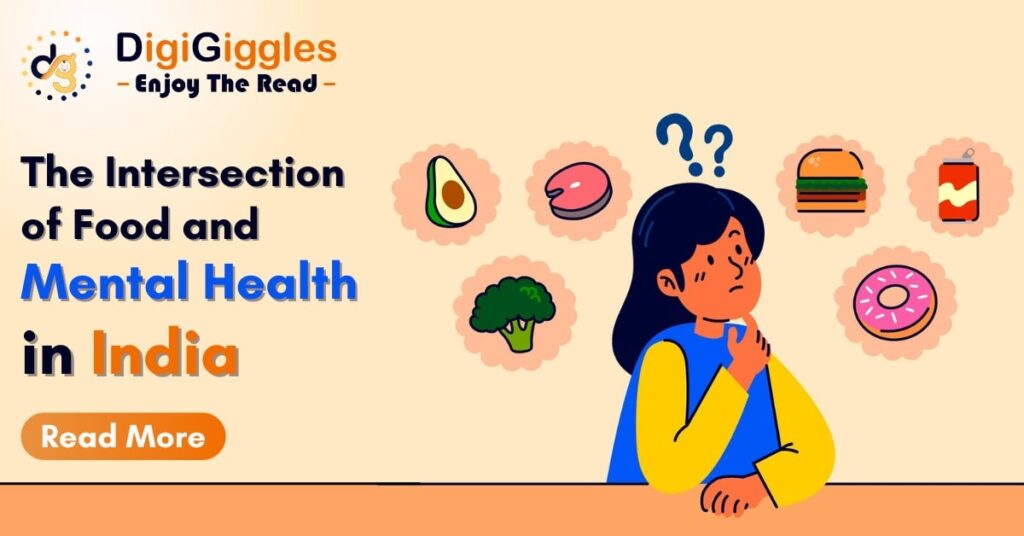
Two fundamental aspects of human existence, nutrition, and psychological health, intertwine intricately, contributing to our overall well-being. In India, renowned for its rich culinary traditions and an expanding concern for mental health, exploring the intersection of food and psychological well-being becomes pivotal. This article delves into the complex relationship between what we consume and its profound impact on our mental health, emphasizing both the challenges and opportunities presented in this diverse nation.
Nutritional Challenges in India:
Our country is a land of diverse cultures and cuisines, and celebrates food as an integral part of its heritage. However, paradoxically, it also grapples with significant nutritional challenges. As per the Food and Agriculture Organization of the United Nations, India is home to over 25% of the world’s undernourished population. While some regions thrive on their culinary legacy, others continue to fight the harsh realities of malnutrition and food insecurity. Food insecurity is a pressing concern that affects millions of Indians, leading to not only physical but also psychological distress.
Recent studies have indicated a significant positive association between food insecurity and various indicators of psychological distress. This distress encompasses mental health issues such as depression and anxiety. These studies span across diverse sections of the Indian population, including adults of all ages, college students, individuals living with chronic illnesses, and parents.
The Psychological Toll of Food Insecurity:
Food insecurity, characterized by the absence of sufficient physical, social, and economic access to safe, nutritious food, affects a substantial portion of India’s population. For many, it results in feelings of deprivation, restricted dietary choices, and anxiety concerning the availability of food. Such individuals often experience psychological distress that goes beyond the physical ramifications of insufficient nutrition.
Pregnant women in India are particularly vulnerable to the psychological impact of food insecurity. Research conducted among pregnant women found a significant association between household food insecurity and mental distress during pregnancy. This highlights the broader repercussions of food insecurity, reaching far beyond the individuals affected. Often, mothers in food-insecure households endure emotional stress and anxiety, sacrificing their own meals to ensure their children have enough to eat, a phenomenon known as ‘maternal deprivation.’
Government Initiatives to Tackle Nutritional Challenges:
Several government initiatives are dedicated to addressing the challenge of food insecurity. The most prominent among these is the National Food Security Act, implemented in 2013. This act strives to provide subsidized food grains to nearly two-thirds of India’s population, ensuring they have access to essential nutrition. Additionally, the Midday Meal Scheme, designed to offer nutritious meals to school children, plays a vital role in addressing child malnutrition. Such efforts are critical steps toward enhancing food security and, consequently, the psychological well-being of millions of Indians.
However, it is essential to acknowledge the complexities of India’s food security landscape. While the country has made significant strides in tackling food insecurity, challenges such as the timely distribution of food grains and the effective implementation of welfare schemes persist. These challenges can compound psychological distress, particularly among vulnerable populations.
Cultural Diversity and Its Influence on Mental Health:
India’s culinary diversity mirrors its cultural tapestry. The nation boasts a rich spectrum of regional cuisines, from the fiery flavors of the South to the aromatic delicacies of the North. Each region offers unique dishes, ingredients, and culinary traditions that cater to diverse tastes and preferences. Yet, this cultural diversity also poses challenges to mental health.
For instance, the prevalence of food allergies and intolerances in India means that dietary restrictions are commonplace. Individuals who cannot consume certain foods may experience feelings of exclusion or frustration, which can contribute to psychological distress. Coping with these challenges while embracing India’s culinary heritage is an ongoing battle for many.
Research and Intervention Opportunities:
While the intersection of food and mental health presents several challenges in India, it also provides opportunities for research and intervention. India’s growing food and wellness industry is beginning to recognize the significance of holistic well-being. The demand for nutritionists, dieticians, and mental health professionals specializing in this unique intersection is on the rise. As people become more health-conscious, there is a greater understanding of how a balanced diet can positively impact mental health.
Research initiatives that explore the connection between regional diets and mental well-being are essential. Understanding how traditional foods and dietary habits contribute to psychological resilience can empower individuals and communities. Moreover, India’s diverse culinary heritage offers a rich source of inspiration for creating nutritious, mental health-focused recipes that cater to different tastes.
Conclusion:
In India, the intersection of food and mental health presents both challenges and opportunities. While millions grapple with food insecurity and the resulting psychological distress, there is a growing realization that the power to transform this narrative lies with individuals, communities, and policymakers. India’s diverse culinary heritage, coupled with an increased awareness of the importance of mental health, offers a unique platform for change.
By embracing traditional cuisines, encouraging research, and expanding interventions, India can pave the way for a healthier, happier society. The journey to improved mental health commences on our plates, and in India, it is a journey worth embarking upon. As the nation continues to evolve, understanding the intricate interplay between food and mental well-being is crucial to ensure that no Indian goes to bed hungry or stressed about their next meal.